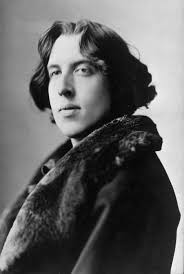The Picture of Dorian Gray Page #7
The Picture of Dorian Gray is a Gothic and philosophical novel by Oscar Wilde, first published complete in the July 1890 issue of Lippincott's Monthly Magazine. Fearing the story was indecent, prior to publication the magazine's editor deleted roughly five hundred words without Wilde's knowledge.
"Let us go and sit in the shade," said Lord Henry. "Parker has brought out the drinks, and if you stay any longer in this glare, you will be quite spoiled, and Basil will never paint you again. You really must not allow yourself to become sunburnt. It would be unbecoming." "What can it matter?" cried Dorian Gray, laughing, as he sat down on the seat at the end of the garden. "It should matter everything to you, Mr. Gray." "Why?" "Because you have the most marvellous youth, and youth is the one thing worth having." "I don't feel that, Lord Henry." "No, you don't feel it now. Some day, when you are old and wrinkled and ugly, when thought has seared your forehead with its lines, and passion branded your lips with its hideous fires, you will feel it, you will feel it terribly. Now, wherever you go, you charm the world. Will it always be so? ... You have a wonderfully beautiful face, Mr. Gray. Don't frown. You have. And beauty is a form of genius--is higher, indeed, than genius, as it needs no explanation. It is of the great facts of the world, like sunlight, or spring-time, or the reflection in dark waters of that silver shell we call the moon. It cannot be questioned. It has its divine right of sovereignty. It makes princes of those who have it. You smile? Ah! when you have lost it you won't smile.... People say sometimes that beauty is only superficial. That may be so, but at least it is not so superficial as thought is. To me, beauty is the wonder of wonders. It is only shallow people who do not judge by appearances. The true mystery of the world is the visible, not the invisible.... Yes, Mr. Gray, the gods have been good to you. But what the gods give they quickly take away. You have only a few years in which to live really, perfectly, and fully. When your youth goes, your beauty will go with it, and then you will suddenly discover that there are no triumphs left for you, or have to content yourself with those mean triumphs that the memory of your past will make more bitter than defeats. Every month as it wanes brings you nearer to something dreadful. Time is jealous of you, and wars against your lilies and your roses. You will become sallow, and hollow-cheeked, and dull-eyed. You will suffer horribly.... Ah! realize your youth while you have it. Don't squander the gold of your days, listening to the tedious, trying to improve the hopeless failure, or giving away your life to the ignorant, the common, and the vulgar. These are the sickly aims, the false ideals, of our age. Live! Live the wonderful life that is in you! Let nothing be lost upon you. Be always searching for new sensations. Be afraid of nothing.... A new Hedonism--that is what our century wants. You might be its visible symbol. With your personality there is nothing you could not do. The world belongs to you for a season.... The moment I met you I saw that you were quite unconscious of what you really are, of what you really might be. There was so much in you that charmed me that I felt I must tell you something about yourself. I thought how tragic it would be if you were wasted. For there is such a little time that your youth will last--such a little time. The common hill-flowers wither, but they blossom again. The laburnum will be as yellow next June as it is now. In a month there will be purple stars on the clematis, and year after year the green night of its leaves will hold its purple stars. But we never get back our youth. The pulse of joy that beats in us at twenty becomes sluggish. Our limbs fail, our senses rot. We degenerate into hideous puppets, haunted by the memory of the passions of which we were too much afraid, and the exquisite temptations that we had not the courage to yield to. Youth! Youth! There is absolutely nothing in the world but youth!" Dorian Gray listened, open-eyed and wondering. The spray of lilac fell from his hand upon the gravel. A furry bee came and buzzed round it for a moment. Then it began to scramble all over the oval stellated globe of the tiny blossoms. He watched it with that strange interest in trivial things that we try to develop when things of high import make us afraid, or when we are stirred by some new emotion for which we cannot find expression, or when some thought that terrifies us lays sudden siege to the brain and calls on us to yield. After a time the bee flew away. He saw it creeping into the stained trumpet of a Tyrian convolvulus. The flower seemed to quiver, and then swayed gently to and fro. Suddenly the painter appeared at the door of the studio and made staccato signs for them to come in. They turned to each other and smiled. "I am waiting," he cried. "Do come in. The light is quite perfect, and you can bring your drinks." They rose up and sauntered down the walk together. Two green-and-white butterflies fluttered past them, and in the pear-tree at the corner of the garden a thrush began to sing. "You are glad you have met me, Mr. Gray," said Lord Henry, looking at him. "Yes, I am glad now. I wonder shall I always be glad?" "Always! That is a dreadful word. It makes me shudder when I hear it. Women are so fond of using it. They spoil every romance by trying to make it last for ever. It is a meaningless word, too. The only difference between a caprice and a lifelong passion is that the caprice lasts a little longer." As they entered the studio, Dorian Gray put his hand upon Lord Henry's arm. "In that case, let our friendship be a caprice," he murmured, flushing at his own boldness, then stepped up on the platform and resumed his pose. Lord Henry flung himself into a large wicker arm-chair and watched him. The sweep and dash of the brush on the canvas made the only sound that broke the stillness, except when, now and then, Hallward stepped back to look at his work from a distance. In the slanting beams that streamed through the open doorway the dust danced and was golden. The heavy scent of the roses seemed to brood over everything. After about a quarter of an hour Hallward stopped painting, looked for a long time at Dorian Gray, and then for a long time at the picture, biting the end of one of his huge brushes and frowning. "It is quite finished," he cried at last, and stooping down he wrote his name in long vermilion letters on the left-hand corner of the canvas. Lord Henry came over and examined the picture. It was certainly a wonderful work of art, and a wonderful likeness as well. "My dear fellow, I congratulate you most warmly," he said. "It is the finest portrait of modern times. Mr. Gray, come over and look at yourself." The lad started, as if awakened from some dream. "Is it really finished?" he murmured, stepping down from the platform. "Quite finished," said the painter. "And you have sat splendidly to-day. I am awfully obliged to you."
Translation
Translate and read this book in other languages:
Select another language:
- - Select -
- 简体中文 (Chinese - Simplified)
- 繁體中文 (Chinese - Traditional)
- Español (Spanish)
- Esperanto (Esperanto)
- 日本語 (Japanese)
- Português (Portuguese)
- Deutsch (German)
- العربية (Arabic)
- Français (French)
- Русский (Russian)
- ಕನ್ನಡ (Kannada)
- 한국어 (Korean)
- עברית (Hebrew)
- Gaeilge (Irish)
- Українська (Ukrainian)
- اردو (Urdu)
- Magyar (Hungarian)
- मानक हिन्दी (Hindi)
- Indonesia (Indonesian)
- Italiano (Italian)
- தமிழ் (Tamil)
- Türkçe (Turkish)
- తెలుగు (Telugu)
- ภาษาไทย (Thai)
- Tiếng Việt (Vietnamese)
- Čeština (Czech)
- Polski (Polish)
- Bahasa Indonesia (Indonesian)
- Românește (Romanian)
- Nederlands (Dutch)
- Ελληνικά (Greek)
- Latinum (Latin)
- Svenska (Swedish)
- Dansk (Danish)
- Suomi (Finnish)
- فارسی (Persian)
- ייִדיש (Yiddish)
- հայերեն (Armenian)
- Norsk (Norwegian)
- English (English)
Citation
Use the citation below to add this book to your bibliography:
Style:MLAChicagoAPA
"The Picture of Dorian Gray Books." Literature.com. STANDS4 LLC, 2025. Web. 15 Mar. 2025. <https://www.literature.com/book/the_picture_of_dorian_gray_869>.








Discuss this The Picture of Dorian Gray book with the community:
Report Comment
We're doing our best to make sure our content is useful, accurate and safe.
If by any chance you spot an inappropriate comment while navigating through our website please use this form to let us know, and we'll take care of it shortly.
Attachment
You need to be logged in to favorite.
Log In